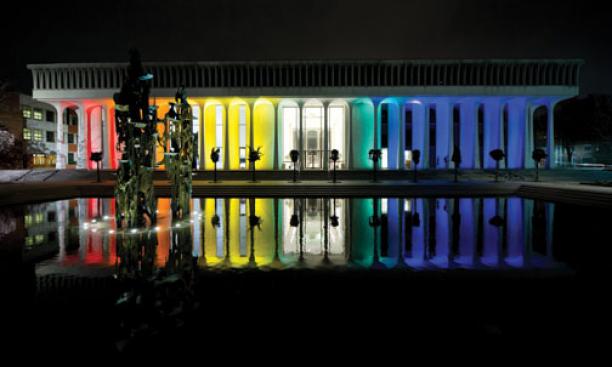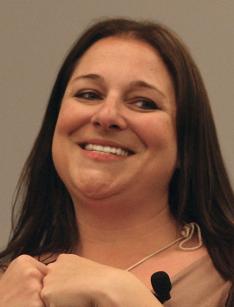
Taking its name from a phrase in “Old Nassau,” the Every Voice conference April 11–13 brought some 550 LGBT Princeton alumni, partners, and family members back to a campus where many had felt invisible at best and persecuted at worst. This was the first time Princeton had reached out specifically to its gay graduates, and when the nighttime columns of the Woodrow Wilson School were lit up in the rainbow of colors of the LGBT-rights movement, most of the returning alumni agreed that the experience had helped them make peace with the University.
“Now I feel like a complete part of Princeton,” said Abby Rubenfeld ’75, adding that although she had loved her time at Princeton, the school had not been welcoming to her as a lesbian. “Princeton always felt tolerant, ” said Nick Allison ’01, “but today is the first time I feel welcomed and embraced.”
It was a busy three days, full of lectures and panels on topics ranging from marriage equality and gay parenting to activism and AIDS. There were screenings of films by alumni, including the Academy Award-nominated documentary How to Survive a Plague (produced by Howard Gertler ’96 and Loring McAlpin ’83), a conversation between best-selling authors Jodi Picoult ’87 and Jennifer Weiner ’91, as well as a dance and an LGBT revue, “Princeton’s Night OUT.” Some events were closed to PAW and other media to protect the privacy of participants. But many alumni were eager to tell the story of their Princeton experience, and all 24 slots for the recording of oral histories were filled in advance.
For many, the most emotional event was the memorial service Saturday afternoon. “It was incredibly moving,” said Robert Gleason ’87, citing not only the toll that HIV/AIDS has taken on gay men, but also the fact that many who sought comfort in their faith had found themselves cast out. “To have a university chapel be so welcoming and affirming was a powerful thing,” he said.The service built to a moment when participants were invited to come forward and speak the names of loved ones and friends who had died. Hundreds of names were spoken; some alumni shared one or two, others as many as 20. Several participants said, after speaking a name: “the love of my life.”
Classes spanning more than 60 years were represented at the conference, and attendees reported widely divergent Princeton experiences. “Often you didn’t know who was gay, or even if you were,” said John Catlett ’64. “I didn’t realize it was possible [to live as a gay man], in terms of my own acceptance of it, until my early 30s.”
For many people, the event, which was organized by the Alumni Association, provided a “chance to bring all of their identities together,” said Gleason. “There are an awful lot of alums who had previously had separate identities — whether they were L, G, B, or maybe not out when they were at Princeton — those were separate parts of their lives. I talked to people over the weekend who said, ‘Not only were those identities not previously integrated for me, but I never thought they could be.’”
A panel featuring current students showed just how much the culture has changed at Princeton, where today there are an estimated 50 to 60 openly gay students in each entering class, according to LGBT Center director Debbie Bazarsky. Shehzad Ukani ’13 came to the panel in bright red drag. He and his fellow panelists agreed that while homophobia occasionally reared its head, their sexual orientation was no big deal to most of their peers. Richard Gadsden ’13 recalled sheepishly how, having worked up the courage to tell his roommate “I like dudes,” the reply was a shrug. “OK,” said the bewildered roommate. “Anything else?”
If the weekend had a hero, it was President Tilghman, under whose tenure Princeton not only hosted the Every Voice conference but created the LGBT Center, in 2005. During a question-and-answer session in which she received two standing ovations, Tilghman said that one of her proudest moments came when she overheard a woman visiting campus with her gay, prospective-student son, say, “Thank heavens! My son will be safe here!”
Charlie Katzenbach ’71, who recently underwent gender transition, posted on Facebook that the weekend had made her fall in love with Princeton for the first time. “Those were the first times I’ve sung ‘Old Nassau,’ ” she reported. “Guess I’ll have to learn the words.”


